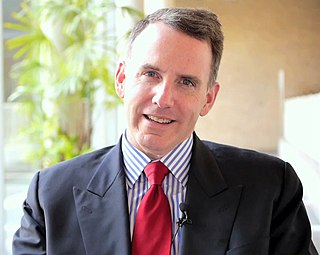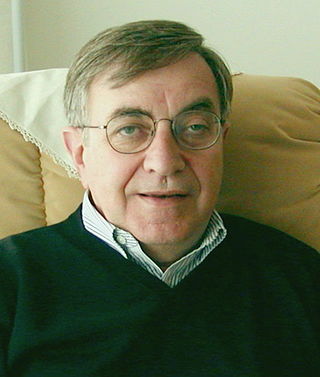
Simon Smith Kuznets was a Russian-born American economist and statistician who received the 1971 Nobel Memorial Prize in Economic Sciences "for his empirically founded interpretation of economic growth which has led to new and deepened insight into the economic and social structure and process of development."

Martin Stuart Feldstein was an American economist. He was the George F. Baker Professor of Economics at Harvard University and the president emeritus of the National Bureau of Economic Research (NBER). He served as president and chief executive officer of the NBER from 1978 to 2008. From 1982 to 1984, Feldstein served as chairman of the Council of Economic Advisers and as chief economic advisor to President Ronald Reagan. Feldstein was also a member of the Washington-based financial advisory body the Group of Thirty from 2003.

Steven David Levitt is an American economist and co-author of the best-selling book Freakonomics and its sequels. Levitt was the winner of the 2003 John Bates Clark Medal for his work in the field of crime, and is currently the William B. Ogden Distinguished Service Professor of Economics at the University of Chicago as well as the Faculty Director and Co-Founder of the Center for Radical Innovation for Social Change at the University of Chicago which incubates the Data Science for Everyone coalition. He was co-editor of the Journal of Political Economy published by the University of Chicago Press until December 2007. In 2009, Levitt co-founded TGG Group, a business and philanthropy consulting company. He was chosen as one of Time magazine's "100 People Who Shape Our World" in 2006. A 2011 survey of economics professors named Levitt their fourth favorite living economist under the age of 60, after Paul Krugman, Greg Mankiw and Daron Acemoglu.

Sendhil Mullainathan is an American professor of Computation and Behavioral Science at the University of Chicago Booth School of Business and the author of Scarcity: Why Having Too Little Means So Much. He was hired with tenure by Harvard in 2004 after having spent six years at MIT.
Robert Joseph Barro is an American macroeconomist and the Paul M. Warburg Professor of Economics at Harvard University. Barro is considered one of the founders of new classical macroeconomics, along with Robert Lucas Jr. and Thomas J. Sargent. He is currently a senior fellow at Stanford University's Hoover Institution and co-editor of the influential Quarterly Journal of Economics.

Wesley Clair Mitchell was an American economist known for his empirical work on business cycles and for guiding the National Bureau of Economic Research in its first decades.

Edward Ludwig Glaeser is an American economist who is currently the Fred and Eleanor Glimp Professor of Economics at Harvard University, where he is also the Chairman of the Department of Economics. He directs the Cities Research Programme at the International Growth Centre.

Elhanan Helpman is an Israeli economist who is currently the Galen L. Stone Professor of International Trade at Harvard University. He is also a Professor Emeritus at the Eitan Berglas School of Economics at Tel Aviv University. Helpman is among the thirty most cited economists in the world according to IDEAS/RePEc.

Emmanuel Saez is a French, naturalized American economist who is Professor of Economics at the University of California, Berkeley. His work, done with Thomas Piketty and Gabriel Zucman, includes tracking the incomes of the poor, middle class and rich around the world. Their work shows that top earners in the United States have taken an increasingly larger share of overall income over the last three decades, with almost as much inequality as before the Great Depression. He recommends much higher marginal tax rates, of up to 70% or 90%. He received the John Bates Clark Medal in 2009, a MacArthur "Genius" Fellowship in 2010, and an honorary degree from Harvard University in 2019.

William Edward Spriggs was an American economist who was a professor of economics at Howard University, chief economist for the AFL-CIO, and Assistant Secretary of Labor for Policy in the Obama administration from 2009 to 2012.
Amy Nadya Finkelstein is an American economist who is a professor of economics at the Massachusetts Institute of Technology (MIT), the co-director and research associate of the Public Economics Program at the National Bureau of Economic Research, and the co-Scientific Director of J-PAL North America. She was awarded the 2012 John Bates Clark Medal for her contributions to economics. She was elected to the National Academy of Sciences and won a MacArthur "Genius" fellowship in 2018.

Diego Adolfo Comin is a Spanish economist who is currently Professor of Economics at Dartmouth College.

Emi Nakamura is a Canadian-American economist. She is the Chancellor's Professor of Economics at University of California, Berkeley. Nakamura is a research associate and co-director of the Monetary Economics Program of the National Bureau of Economic Research, and a co-editor of the American Economic Review.
Nancy Qian is a Chinese American economist and currently serves as the James J. O'Connor Professor in the Kellogg School of Management Managerial Economics and Decision Sciences and a Professor by Courtesy at the Department of Economics at Northwestern University. Her research interests include development economics, political economy and economic history. She is a leading development economist and an expert of autocracies and the Chinese economy.
Stefanie Stantcheva is a Bulgarian-born French economist who has served as the Nathaniel Ropes Professor of Political Economy at Harvard University since 2021. She has been a member of the Conseil d’Analyse Économique since 2018. In 2018, she was described by The Economist as one of the best young economists of the decade.
Lisa Blau Kahn is a professor of economics at the University of Rochester. Her research focuses on labor economics with interests in organization, education, and contract theory. From 2014 to 2018, she served as an associate professor of economics at Yale School of Management and as an assistant professor of economics at Yale School of Management from 2008 to 2014. From 2010 to 2011, Kahn served as the senior economist for labor and education policy on President Obama's Council of Economic Advisers.
Larry G. Epstein is a Canadian economist who is currently Professor of Economics at McGill University. He is a Fellow of the Canadian Economics Association and Econometric Society. He was also Fellow of the Royal Society of Canada before moving to the United States.

Anna Gifty Opoku-Agyeman is a Ghanaian-born American activist and writer. She is a co-founder and former CEO of the Sadie Collective, as well as a co-founder and co-organizer of Black Birders Week.
Ṣebnem Kalemli-Özcan is an economist and the Neil Moskowitz Professor of Economics and Finance at the University of Maryland, College Park. She is a co-editor of the Journal of International Economics, on the board of editors of the American Economic Review, an associate editor of the Journal of the European Economic Association and an associate editor of the Journal of Development Economics. She is a research fellow at the NBER and CEPR.
Wojciech Kopczuk is a professor of economics at Columbia University. He is currently the editor-in-chief of the Journal of Public Economics.












